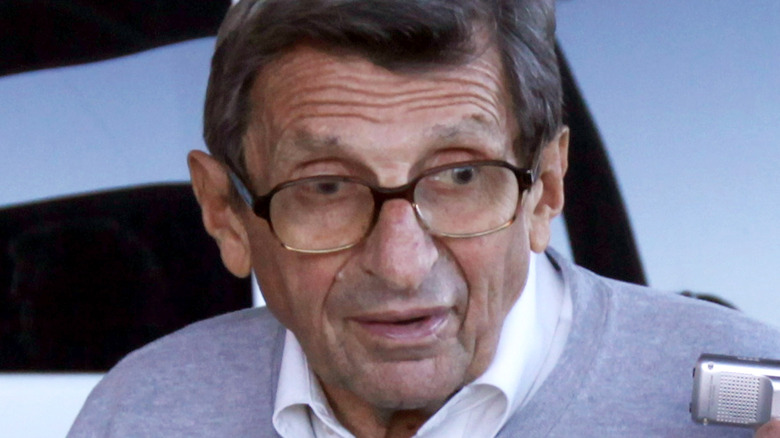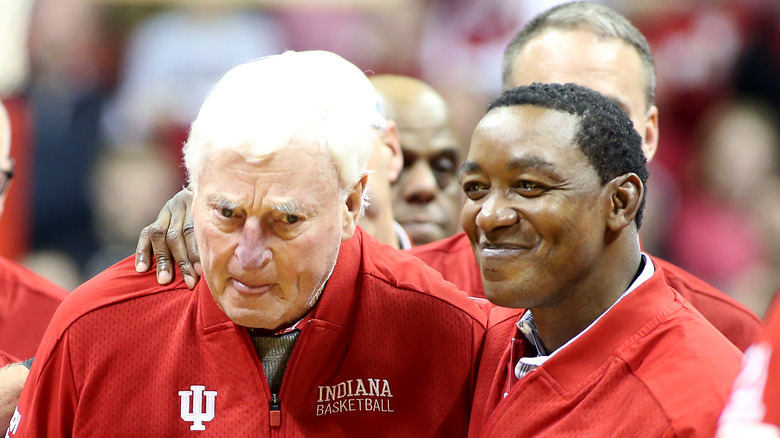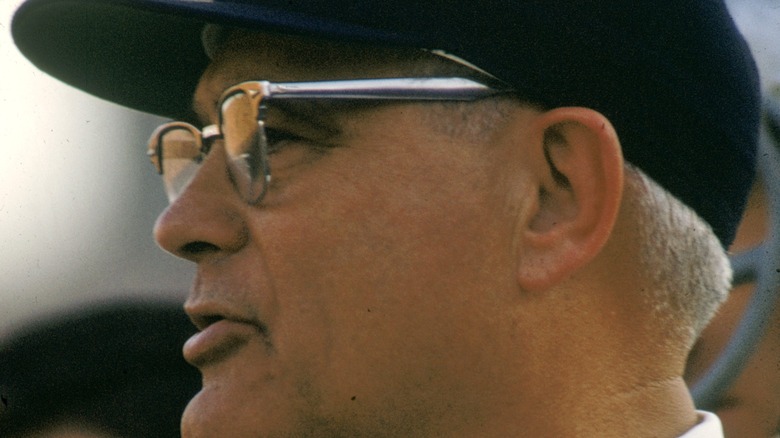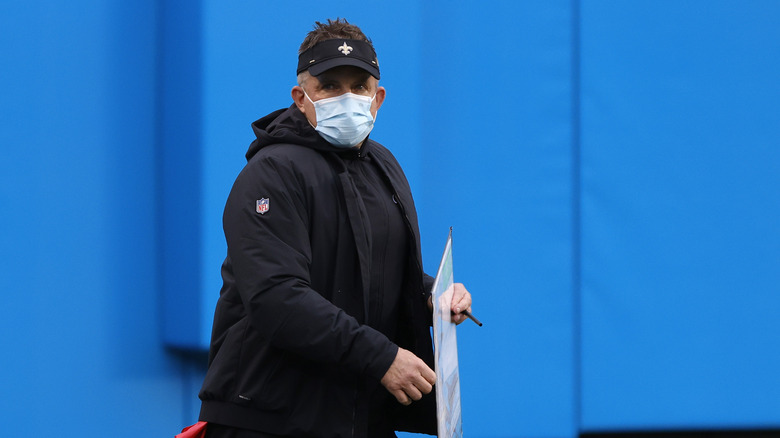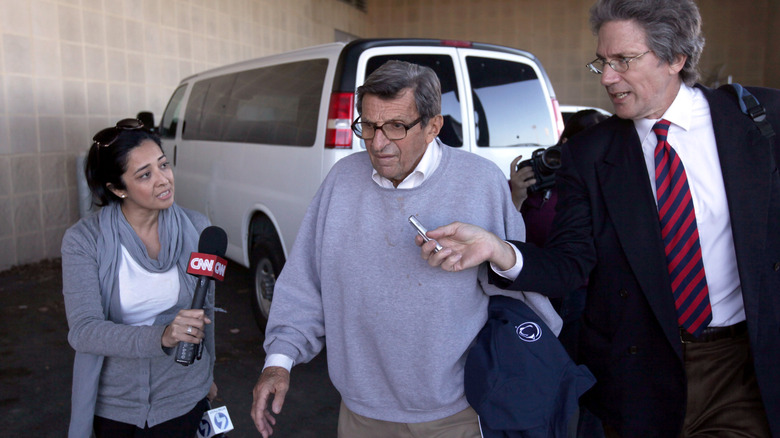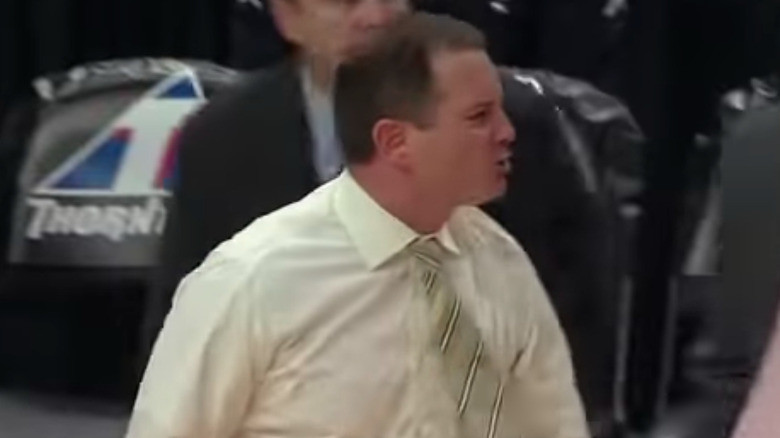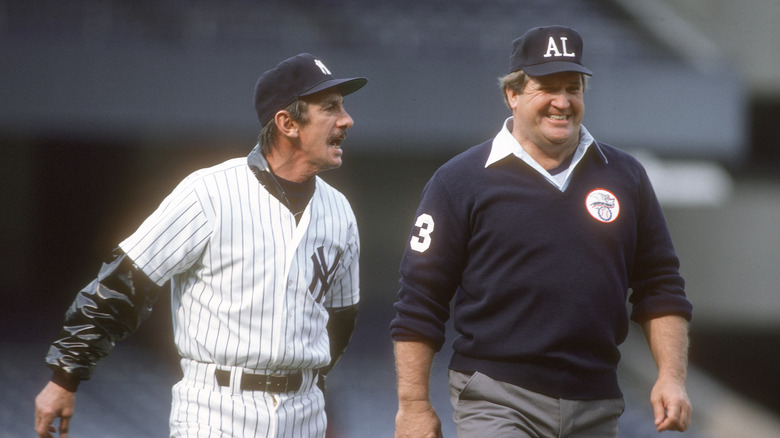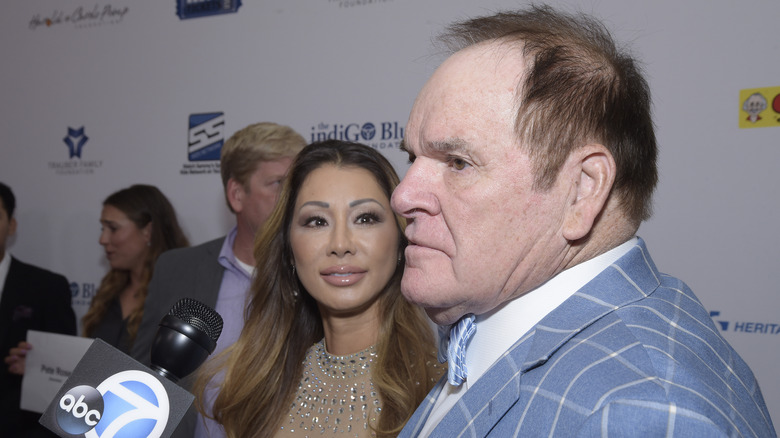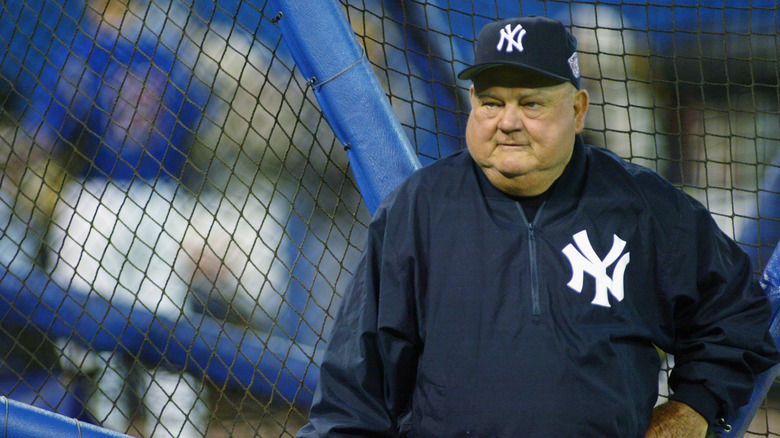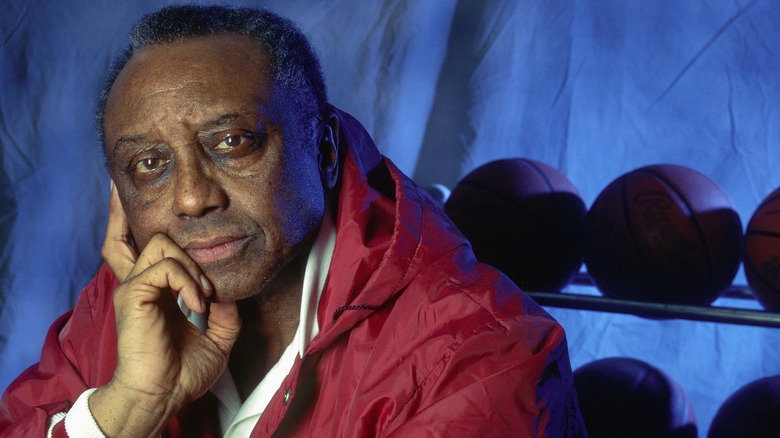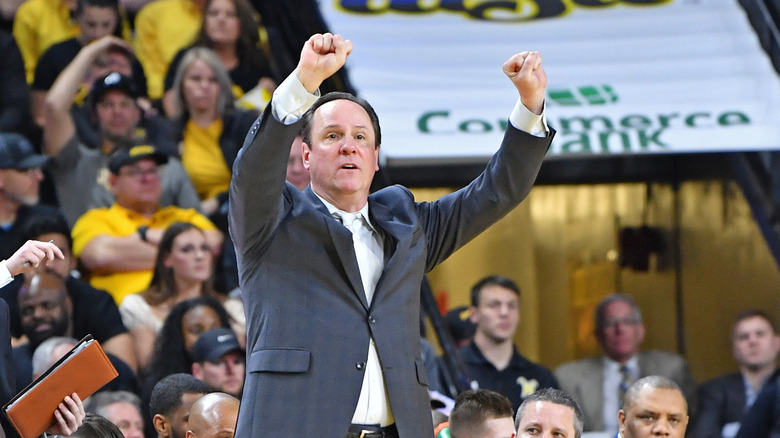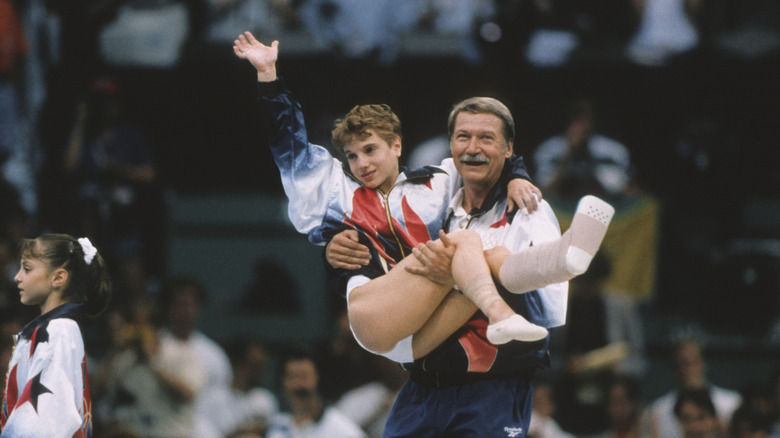Coaches Who Took Things Too Far
Anyone in a position of authority understands the importance of leading by example and setting the right tone for those under them to follow. If a lioness leads her cubs into a pack of hyenas, then the cubs have little chance for survival in the harsh environment. An unprepared admiral endangers everyone on their ship. This same principle applies in the world of sports.
It's the job of the coach to be both the tactician and the guiding hand for their players. They command a great deal of power and are expected to carry themselves with a high degree of respect. That being said, coaches are still human, with all that entails. Their ability to draw up a good game plan can only carry them so far before skeletons long in the closet finally come to the surface. Mix that with millions of dollars, the pressure of success, the stardom that comes with the position, and a heightened ego or sense of entitlement, and you have a recipe for disaster that leaves, for the most part, children and young adults to take the brunt of the punishment.
Here are coaches throughout the world of sports who took things too far.
Bob Knight's temper
Bob Knight retired as the winningest coach in NCAA Division I collegiate basketball, a record broken eventually by his former player, Mike Krzyzewski. According to Yardbarker, Knight's motion offense has become the most popular offense in basketball today. After a short stint at Army, Knight built Indiana University into a basketball powerhouse. He won three National Championships during his three decades, though behind the spotlight, Knight's position allowed him to abuse his players with a fiery temper.
Knight's temper was nothing new. It was well-known to the point of parody. In a 1985 game against Purdue, Knight was ejected after he threw a chair across the court, and he later joked about the incident on "The David Letterman Show." Knight's temper flared with everyone, from referees to the media and even his players.
The end for Knight came at the beginning of 2000, when a video emerged of him putting his hands around the neck of former Indiana basketball player Neil Reed during a practice. Despite the assault being videotaped, and, as detailed by Chron.com, the fact that it was hardly the first time the coach had put his hands on someone in anger, Knight was given just a three-game suspension and a $30,000 fine and put on a zero-tolerance policy. The following September, Knight grabbed a student by the arm and chastised him, and that was the last straw. The coach was fired three days later but was hired the next year by Texas Tech.
The punch that ended Woody Hayes' career
By the time Woody Hayes' coaching career ended, he was largely considered one of the greatest District I coaches in college football. On the gridiron, Hayes led the Ohio State Buckeyes to five National Championships. However, like Bob Knight, Hayes' temper became his undoing.
According to Bleacher Report, those close to the program believed Hayes was thinking about retiring after the 1976 season. However, after losing to UCLA in the Rose Bowl, Hayes returned seeking one more title. The next two years saw great Ohio State teams, but they fell to their rivals, Michigan, each year. Jack Park, a commentator for 97.1 The Fan, said this about how the failures affected the aging Hayes: "Hayes was just different. He had trouble with some things and just blew his top a lot more. They were not completely surprised when something bad happened."
In the final minutes of the 1978 Gator Bowl, down 17-15 against Clemson, Ohio State quarterback Art Schlicter threw an interception, effectively ending the game. The Clemson defender who intercepted the pass, Charlie Bauman, was tackled in front of the Buckeyes' sidelines. Enraged, Hayes punched Bauman, sparking a brawl on the sidelines between the teams. Hayes was fired before the team's plane landed back in Ohio.
However, as detailed by the Youngstown Vindicator, Hayes' temper had flared (and his fists had been raised) many times against reporters and even the commissioner of his conference years before the '78 Gator Bowl.
Bountygate knocks out Gregg Williams and Sean Payton
Despite the physical nature of football, players don't actively attempt to severely injure their opponents. At least, that's what the NFL wants people to think. In the 2009-10 season, the New Orleans Saints won their first Super Bowl, thanks in large part to head coach Sean Payton and newly hired defensive coordinator Gregg Williams. By the following season, the league would begin an investigation into the team, with the coaches at its center.
According to Bleacher Report, on March 2, 2012, the league revealed the results of its two-year investigation and found that 22 to 27 players and coaches had participated in a bounty program, paying defensive players for knocking opponents out of games. Less than three weeks later, the NFL suspended Williams indefinitely and Payton for the 2012 season, in addition to handing down lesser punishments to general manager Mickey Loomis and assistant coach Joe Vitt. Four Saints defensive players were also given suspensions. Despite the coaches appealing the suspensions, audiotapes of Williams telling his players to target vulnerable parts of opposing players did little to help their cause, and their appeals were denied.
Despite the scandal, Payton remains the coach for the Saints, and Williams would coach for different teams until 2020. The players successfully appealed their own suspensions.
Joe Paterno helped cover up Rampant Sexual Abuse
Joe Paterno's story went from "Mr. Rogers" to the most egregious scandal to rock collegiate sports in this generation. According to NPR, Paterno had been a part of Penn State University football since 1950. After spending a decade and a half as an assistant coach, he became the head coach in 1966 and made Penn State into one of the premier programs in the nation.
His tenure ended not with a whisper but with a bang rivaling Krakatoa.
As an assistant coach, Jerry Sandusky worked under Paterno, according to Penn Live. As a defensive coordinator for the program, Sandusky's defenses earned the university the nickname "Linebacker U." Off the field, Sandusky founded "The Second Mile" intending to help troubled foster boys. The charity grew into a statewide program.
Late in 2011, investigators publicly revealed that Sandusky was under suspicion for multiple counts of child molestation. The investigation showed that Penn State's athletic director Tim Curley, senior VP of finances and business Gary Schultz, and Paterno had known about Sandusky's actions for about nine years and kept the information in-house instead of going to the police. When the dam finally burst, Shultz and Curley were charged with making false statements to a grand jury and failing to report possible abuse of a child, Sandusky was charged with 52 counts of sexual abuse on multiple boys, and Paterno was forced to resign as head coach. Paterno died two months later of cancer.
If you or someone you know may be the victim of child abuse, please contact the Childhelp National Child Abuse Hotline at 1-800-4-A-Child (1-800-422-4453) or contact their live chat services.
If you or anyone you know has been a victim of sexual assault, help is available. Visit the Rape, Abuse & Incest National Network website or contact RAINN's National Helpline at 1-800-656-HOPE (4673).
Mike Rice Jr. becomes the new Bob Knight
Mike Rice Jr. came from the school of Bob Knight. Unlike Knight, who had a level of pedigree and success at Indiana which made removing him a long, drawn-out process, Rice was not a successful coach during his three years at Rutgers. This hastened his departure from the university in April 2013 following ESPN's "Outside the Lines" program showing video of Rice and assistants throwing basketballs and hurling slurs at his players.
As Bleacher Report details, Rice seemed not to understand the gravity of the abuse he leveled at his team. Rice stated seven months after his dismissal, "Everything I've ever done is fight, scratch and claw, and now I have to sit back and take it, listen to people say I was abusing my players? I was an idiot, but I never abused anybody."
The video indicated otherwise, and Rice was fired from his position shortly after it became public. Before the video's public release, Rice was given only a three-game suspension and a $50,000 fine for "inappropriate behavior and language," The Star-Ledger reported in December 2012. According to ESPN, former assistant coach Eric Murdock had shown the half-hour video of Rice to the athletic director, Tim Pernetti. Still, it was not until its public release that the university's hand was forced, and Rice was removed.
Billy Martin fights everyone
Billy Martin is probably the most likable man on this list. He was a successful manager for multiple teams, as Baseball-Reference.com details, and famously, he feuded with his boss, New York Yankees owner George Steinbrenner.
According to ESPN, Martin's coaching talents were only hampered by his temper and his scorn for dissenters. In his first job as a manager with the Minnesota Twins, despite a successful first season, he was fired afterward for physically fighting his pitcher, Dave Boswell. His next stint as the Detroit Tigers manager ended when it was discovered that he'd ordered his pitcher to intentionally throw at the batters.
Martin soon returned to the New York Yankees, with whom he had his best years as a player. And his temper followed, something which was never more evident than in 1977. Martin argued constantly with owner George Steinbrenner and superstar outfielder Reggie Jackson. "SportsCentury" detailed a conflict during a televised game in 1977 when Jackson and Martin had a heated exchange in the dugout. Despite this, the Yankees won the World Series that year. By the following season, the three were still at each other's throats.
According to the New York Times, on July 23, 1978, Martin said this to the press about his two rivals: "The two of them deserve each other: One's a born liar, the other's convicted." Martin was forced to resign, though he would return to manage the Yankees four more times before his death in 1989.
Charlie Hustle becomes Charlie Hustler
As a player, Pete Rose became one of the greatest baseball stars of his era. After breaking MLB's all-time hit record, the man known as "Charlie Hustle" was a surefire Hall of Famer. However, Rose's relentless playing style didn't always translate well to managing, and his gambling addiction eventually landed him in a jail cell.
According to Baseball-Reference.com, Rose's first three years as the manager of the Cincinnati Reds were spent as a player/manager. He kept the position after he retired from playing. In 1988, Rose made headlines for all the wrong reasons. As told by Fanbuzz, Rose was handed a 30-game suspension and a $10,000 fine for shoving an umpire. Rose survived the incident with his job secure, but his fortunes soon ran out.
According to Sports Illustrated, baseball commissioner Peter Ueberroth announced his office was investigating Rose in 1989. SI released a feature the next day detailing Rose's ties to gambling. Though he denied everything, the evidence showed that Rose not only gambled but gambled on his own games. This led Rose to be placed on the permanently ineligible list, banning him from baseball for life. He lost his manager position and was ineligible for the Hall of Fame.
Shortly following baseball's investigation, Rose was found to have over $354,000 in unpaid taxes and received a five-month prison sentence and a $50,000 fine, as reported by the LA Times.
Don Zimmer Charges at Pedro Martinez
It is never a good look to knock down an old man. That being said, when it came to the Yankees/Red Sox rivalry at the beginning of the 2000s, social norms were usually left to the birds. In 2003, the two rivals were battling in a best-of-seven series to win the pennant. During Game 3, tensions hit a boiling point that exploded into a confrontation on the field. During the chaos, 72-year-old bench coach Don Zimmer decided to charge full-speed at 32-year-old Red Sox pitcher Pedro Martinez.
The fight went as one would expect. The much younger Martinez sidestepped Zimmer, grabbed his head, and threw him to the ground. As Martinez walked back toward his dugout, security and Yankees players assisted the discombobulated Zimmer. After the game, an emotional Zimmer was apologetic about the scuffle, saying, "I'm embarrassed for the Yankees, the Red Sox, the fans, the umpires, and my family."
In his 2015 autobiography, Martinez said the incident was the only regret of his career, Sports Illustrated reports: "When 72-year-old Don Zimmer came barreling toward me, I wish I had not grabbed his head and pushed him to the Fenway grass as he stumbled and fell forward. ... In my entire baseball career, my reaction to Zimmer's charge is my only regret."
John Calipari and John Chaney's infamous press conference
One would hope a coach will act as a leader and set a good example for their players. However, collegiate rivalries tend to bring out the worst in people, as evident in a 1994 game between UMass and Temple. As detailed by the documentary "One and Not Done," the two schools had been bitter rivals for years, with UMass, being led by young coach John Calipari, overtaking Temple, led by veteran coach John Chaney (pictured).
Daily Hampshire Gazette reporter Matt Vautour noted (via "One and Not Done") that during the close game, which UMass won, the coaches had been yelling at the refs for better calls, and afterward, Calipari continued to push the refs, complaining about calls. As Calipari was giving a press conference, Chaney entered the room and lambasted Calipari's behavior. Eventually, Chaney approached Coach Cal, who stepped from behind the podium himself. As others rushed in between the two men, Chaney screamed to Calipari "I'll kill you!" and "When I see you, I'ma kick your a**."
According to the LA Times, Chaney was given a one-game suspension and apologized for the incident shortly after. Funnily enough, the two coaches later became friends, seeing that they were two sides of the same coin. As detailed by MassLive, in 2021, after coach Chaney passed away, Calipari, now the coach of the University of Kentucky, spoke glowingly about his former rival and friend.
Mark Downs Jr. ordered his player to be injured
While the competitive world of collegiate and professional sports may lead coaches to some unsavory acts, Little League baseball is certainly not to that level of intensity. Or is it? In the mind of Mark Downs Jr., the children under his leadership were playing a blood sport. As told by CBS News, Downs paid one of his players $25 to injure a teammate before a playoff game! The reason was that the targeted player was not as good as the others, so Downs didn't want to play him.
In October 2006, Downs was handed two consecutive prison sentences of six to 36 months after being found guilty of corruption of minors and criminal solicitation to commit simple assault. Downs still maintained his innocence to reporters as he left the courtroom. Judge Ralph Warman had very harsh words for the defendant, saying, "These acts are extremely outrageous and extremely reprehensible since the defendant was involved in the coaching of a youth league."
The victim's mother said that her son feared picking up new activities after the attack, scared that he would be hurt again.
If you or someone you know may be the victim of child abuse, please contact the Childhelp National Child Abuse Hotline at 1-800-4-A-Child (1-800-422-4453) or contact their live chat services.
Gregg Marshall's history of abuse is uncovered
Gregg Marshall's tenure at Wichita State saw his basketball program competing in seven Final Four tournaments and netting a victory in the NIT tournament. According to CBS Sports, he is the winningest coach in the school's history. However, in 2020, this came to an abrupt end. Wichita State officials forced Marshall to resign after multiple allegations involving the verbal and physical abuse the coach had inflicted upon his players and an assistant coach.
The dismissal followed an investigation after the university received word that news reports alleging Marshall's abuse were to be published. The reports stated that during the 2015-16 season, Marshall had punched a former player, Shaq Morris, during a practice. This claim was backed by other players. Stadium reports that during the same season, he body-shamed a player by lifting his shirt, grabbing his stomach, and commenting on his size. The next season, Marshall choked his assistant coach Kyle Lindsted, and during the 2018-19 season, he mocked a player of Native American descent, telling him "to get back on his horse" and making "howling noises."
Athletic Director Darron Boatright had this to say about the decision: "While the university acknowledges the success of the basketball program under Coach Marshall, this decision is in the best interest of the university, its student-athletes and the WSU community."
Horror stories from the Károlyi Ranch
Who could forget the moment from the 1996 Olympics when Kerri Strug won the gold medal for the U.S. gymnastic team after suffering what turned out to be a lateral sprain and tendon damage? Famed U.S. gymnastic coach Béla Károlyi carrying her to the podium has become an iconic Olympic moment. In contrast, a book from a former athlete details the dark side of the well-known coach.
Károlyi is a staple of U.S. Olympic gymnastics. As told by ESPN, Béla and his wife Martha defected to the United States from Romania in 1981 after the success of their protégée Nadia Comaneci. They established "The Károlyi Ranch," a remote gymnastic training center in Texas that has become the Mecca of Olympic gymnastics. However, in an autobiography, Comaneci detailed systemic abuse at the ranch, the NY Post reports. This included starving athletes, physical abuse, and ignoring injuries, among other things. She said eating and psychological disorders tended to follow these gymnasts. The Ranch was also a place where former physician Larry Nassar sexually abused athletes.
